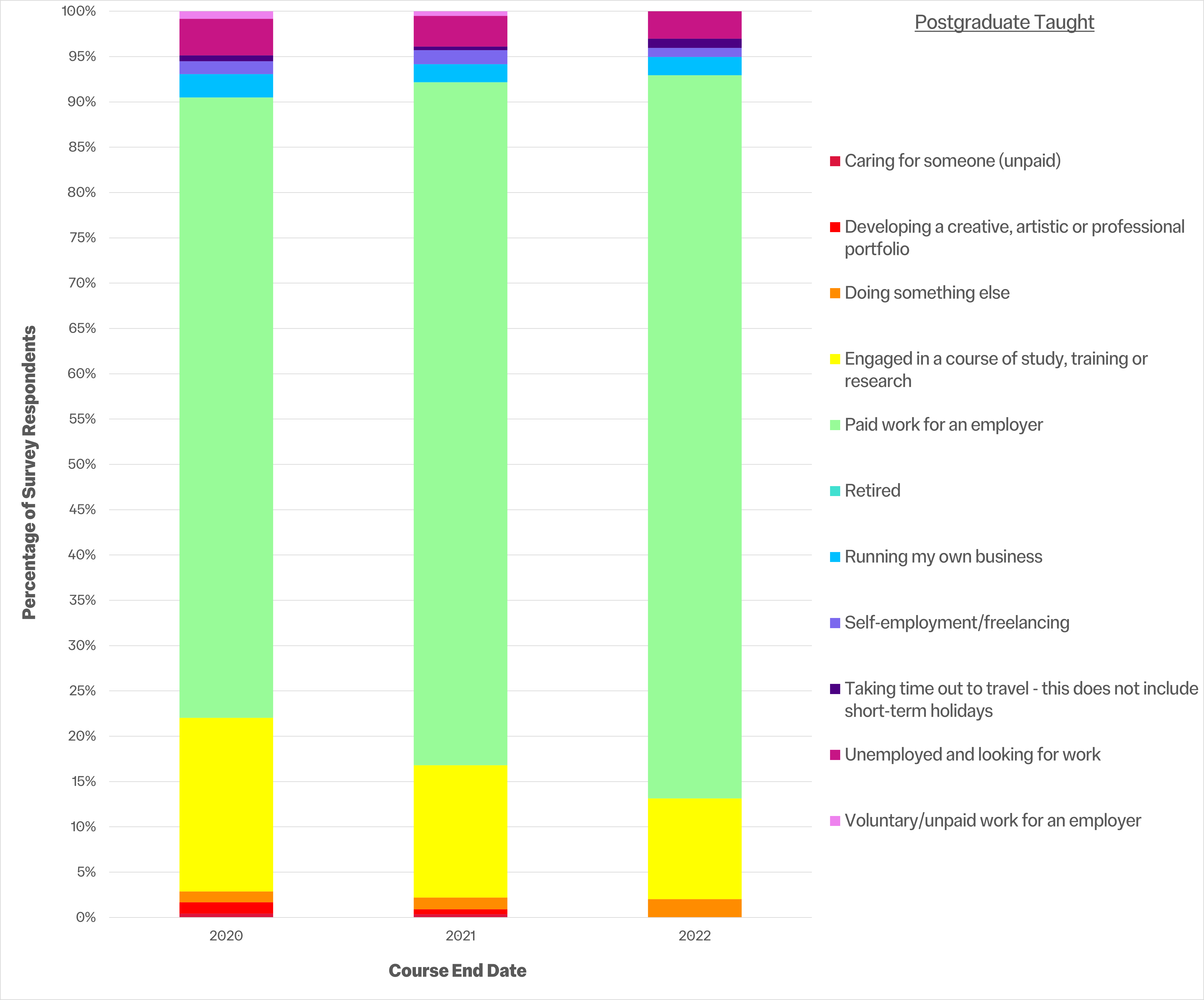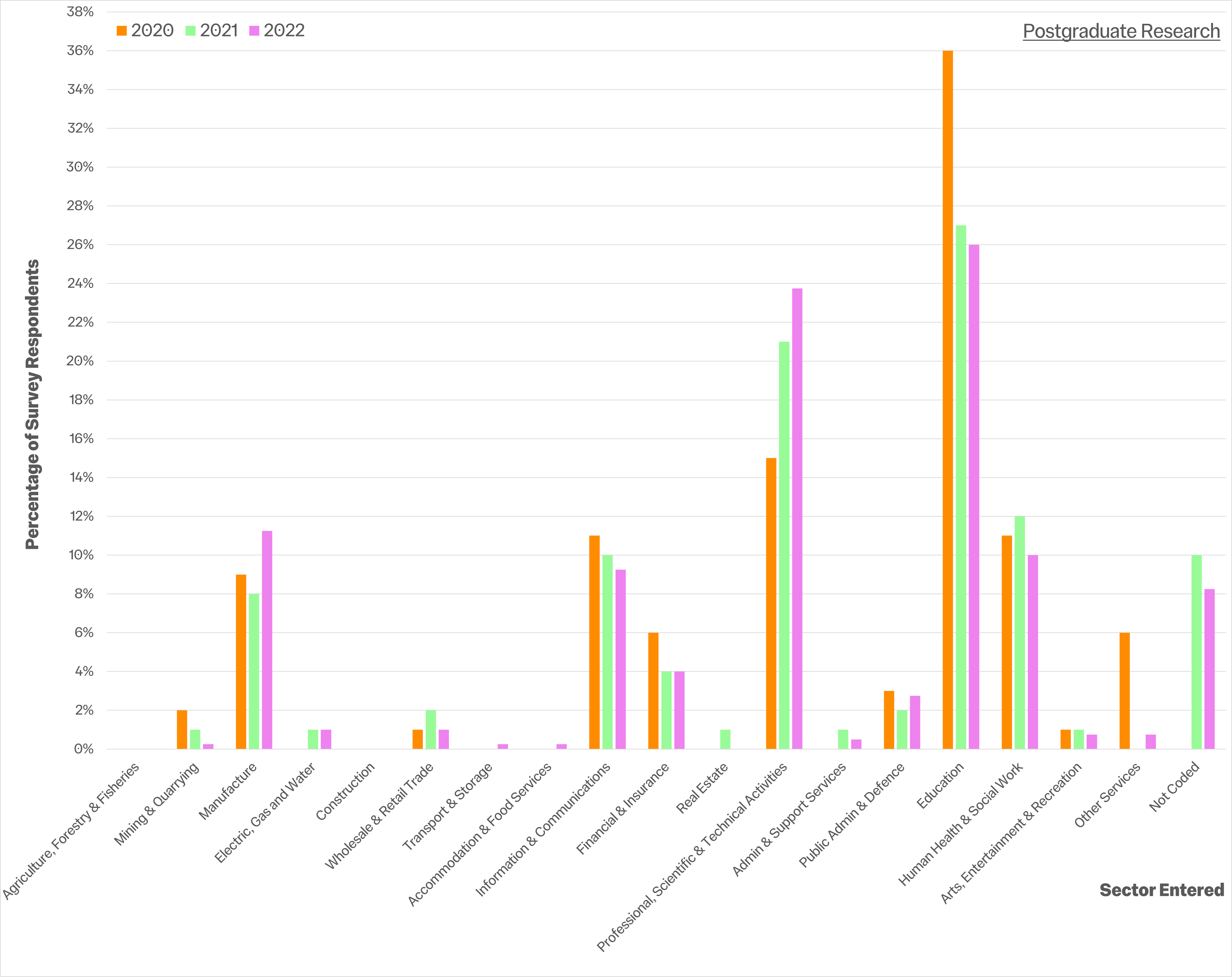Where does the data come from?
The guidelines for carrying out this survey come from the Higher Education Statistics Agency (HESA). Under the new survey the level of data for PhD graduates has increased. The data below is for postgraduates who completed their course between 1 August 2020 and 31 July 2022.
What can I find in this section?
In this section you can view the overall postgraduate destinations statistics below or you can look at individual destinations data by Imperial department by using the 'By department' tab below. You can also browse through case studies of previous Imperial students and their career paths to date.
Please note that only Postgraduate Taught (Master's) students' data is available in this section. There is no data available for Postgraduate Research (PhD) students.
How the data is presented:
All data presented here has been subject to HESA rounding methodology in order to reduce the risk of identifying individuals from published figures. In short, the rounding methodology involves rounding all figures to the nearest 5 individuals and suppressing percentages derived from base sizes of fewer than 22.5 individuals. This may result in the information for some departments being unavailable, and in some cases, totals of 99% or 101%.
If you have any enquiries about destinations of Imperial students, please email us.
Graduate outcomes tabs
Overall destinations of postgraduate taught (Master's) students from the Graduate Outcomes Survey 2020-22
In 2022:
- 0% were caring for someone (unpaid)
- 0% were developing a creative, artistic or professional portfolio
- 2% were doing something else
- 11% were engaged in a course of study, training or research
- 79% were in paid work for an employer
- 0% were retired
- 2% were running their own business
- 1% were self-employed/freelancing
- 1% were taking time out to travel (this does not include short-term holidays)
- 3% were unemployed and looking for work
- 0% were in voluntary/unpaid work for an employer.
Bar chart showing the results of the PGT collection of the new Graduate Outcomes Survey (GOS) for 2022 in comparison with 2021 and 2020 results:

Overall destinations of postgraduate research (PhD) students from the Graduate Outcomes Survey 2020-22
In 2022:
- 0% were caring for someone (unpaid)
- 0% were developing a creative, artistic or professional portfolio
- 1% were doing something else
- 21% were engaged in a course of study, training or research
- 71% were in paid work for an employer
- 2% were running their own business
- 1% were self-employed/freelancing
- 1% were taking time out to travel (this does not include short-term holidays)
- 3% were unemployed and looking for work
- 0% were doing voluntary or unpaid work
Bar chart showing the results of the PGR collection of the new Graduate Outcomes Survey (GOS) for 2022 in comparison with 2021 and 2020 results:

Comparison of industry sector entered for postgraduates of taught (Master's) courses

The bar chart above shows the industry sectors entered by postgraduate taught (Master's) students surveyed in the Graduate Outcomes Survey 2022, in comparison with 2021 and 2020 results.
Comparison of industry sector entered for postgraduates of research (PhD) courses

The bar chart above shows the industry sectors entered by postgraduate research (PhD) students surveyed in the Graduate Outcomes Survey 2022, in comparison with 2021 and 2020 results.
Please note that the Postgraduate Taught (PGT) students in the below departments were surveyed and responded in sufficient quantity to present here. Missing departments where 'no data available' is stated, is due to a low response rate.
AERONAUTICAL ENGINEERING
- Data not available
BIOENGINEERING
- Bioengineering PGT tables 2022 [PDF] - text-only tables for Master's employment statistics and destinations [pdf]
BUSINESS SCHOOL
- Business School PGT tables 2022 [PDF] - text-only tables for Master's employment statistics and destinations [pdf]
CHEMICAL ENGINEERING
- Chemical Engineering PGT tables 2022 [PDF] - text-only tables for Master's employment statistics and destinations [pdf]
CHEMISTRY
- Data not available
CIVIL ENGINEERING
- Civil Engineering PGT tables 2022 [PDF] - text-only tables for Master's employment statistics and destinations [pdf]
CLINICAL SCIENCE
- Data not available
COMPUTING
- Computing PGT tables 2022 [PDF] - text-only tables for Master's employment statistics and destinations [pdf]
EARTH SCIENCE AND ENGINEERING
- Earth Science and Engineering PGT tables 2022 [PDF] - text-only tables for Master's employment statistics and destinations [pdf]
ELECTRICAL AND ELECTRONIC ENGINEERING
- Electrical and Electronic Engineering PGT tables 2022 [PDF] - text-only tables for Master's employment statistics and destinations [pdf]
ENVIRONMENTAL POLICY
- Environmental Policy PGT tables 2022 [PDF] - text-only tables for Master's employment statistics and destinations [pdf]
LIFE SCIENCES
- Life Sciences PGT tables 2022 [PDF] - text-only tables for Master's employment statistics and destinations [pdf]
MATERIALS
- Data not available
MATHEMATICS
- Mathematics PGT tables 2022 [PDF] - text-only tables for Master's employment statistics and destinations [pdf]
MECHANICAL ENGINEERING
- Data not available
MEDICINE
- No data available
NATIONAL HEART AND LUNG INSTITUTE (NHLI)
- NHLI PGT tables 2022 [PDF] - text-only tables for Master's employment statistics and destinations [pdf]
PHYSICS
- Data not available